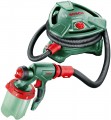Power consumption
The power consumed by the operation of an electric tool (see "Type").
Most modern spray guns, even performant ones, have a rather low power: for example, models
with more than 1 kW are extremely rare, and in most cases, power consumption does
not exceed 500 W at all. So when connecting such equipment to sockets, there are usually no problems; only single units of high performance, requiring 3.5 kW or more, have to be connected according to special rules (directly to the shield). In other cases, data on power consumption is most often not needed for normal use and may be required only for specific tasks — for example, to calculate the load on an autonomous generator.
Paint consumption
Consumption of paint or other material (for example, mortar for plaster) when the spray gun is operating in normal mode.
The higher the flow rate, the more material the tool can apply per unit of time, the better it is suitable for processing large areas and for applying thick coatings. On the other hand, not all types of work require high productivity, and sometimes relatively low consumption is optimal. Detailed recommendations on this subject for different situations can be found in special sources.
Nozzle size
The diameter of the nozzle at the outlet of the spray gun.
It is from this nozzle that paint or other working material comes out. And the productivity and spot size at the exit depend on the diameter. Accordingly, larger nozzles are better suited for processing large surfaces, while smaller nozzles provide greater precision and accuracy. Thus, this parameter is directly related to the type of device (see above). There are also
spray guns with a replaceable nozzle, when more than one nozzle is provided in the kit, which expands the possibilities of using the device.
Container volume
The total volume of the paint reservoir supplied with the gun.
Large tank, on the one hand, allows you to "charge" a lot of material and work for a long time. On the other hand, it increases the size and weight of the device; and a large amount of paint will also weigh accordingly (although for models with a separate tank location - see above - this is not critical). Therefore, the thinner and more delicate the work for which the spray gun is designed, the, as a rule,
the smaller the tank volume : for example, in airbrushes (see "View") it rarely exceeds 50 ml, and in plaster models, in turn, can be measured liters. Therefore, most models have a volume of no more than a liter, namely
500 ml,
600 ml,
700 ml,
800 ml,
1000 ml.
Replaceable container
The presence of a replaceable tank will be appropriate when completely different jobs are carried out with a spray gun with significantly different amounts of paint. Sometimes it is inappropriate to fill the 800 mL tank if you need to paint small volumes. It is to save paint consumption and comfort in use (weight also plays a role) in some spray guns a replaceable tank of a smaller capacity is provided.
Hose length
The length of the hose supplied with the tool.
This indicator has two meanings. On the one hand, the long hose provides more freedom of movement, allowing you to work farther from the compressor; this is especially important when used with powerful, heavy compressors that are not designed to be carried around often. On the other hand, in some cases a relatively short hose is more convenient; a typical example of such a situation is the presence on the farm of a compact compressor that can be constantly carried with you.
Actually, if the compressor is initially included in the delivery set, then the manufacturer chooses the length of the hose, taking into account its features. But if the spray gun is bought without a compressor, you should pay special attention to this parameter. As for the specific length, the shortest hoses found in modern spray guns
do not exceed 2 m, but this is often quite enough; a length of
2 – 5 m can be called an average, and in powerful models (mainly paint stations) you can find hoses and
more than 5 m.

